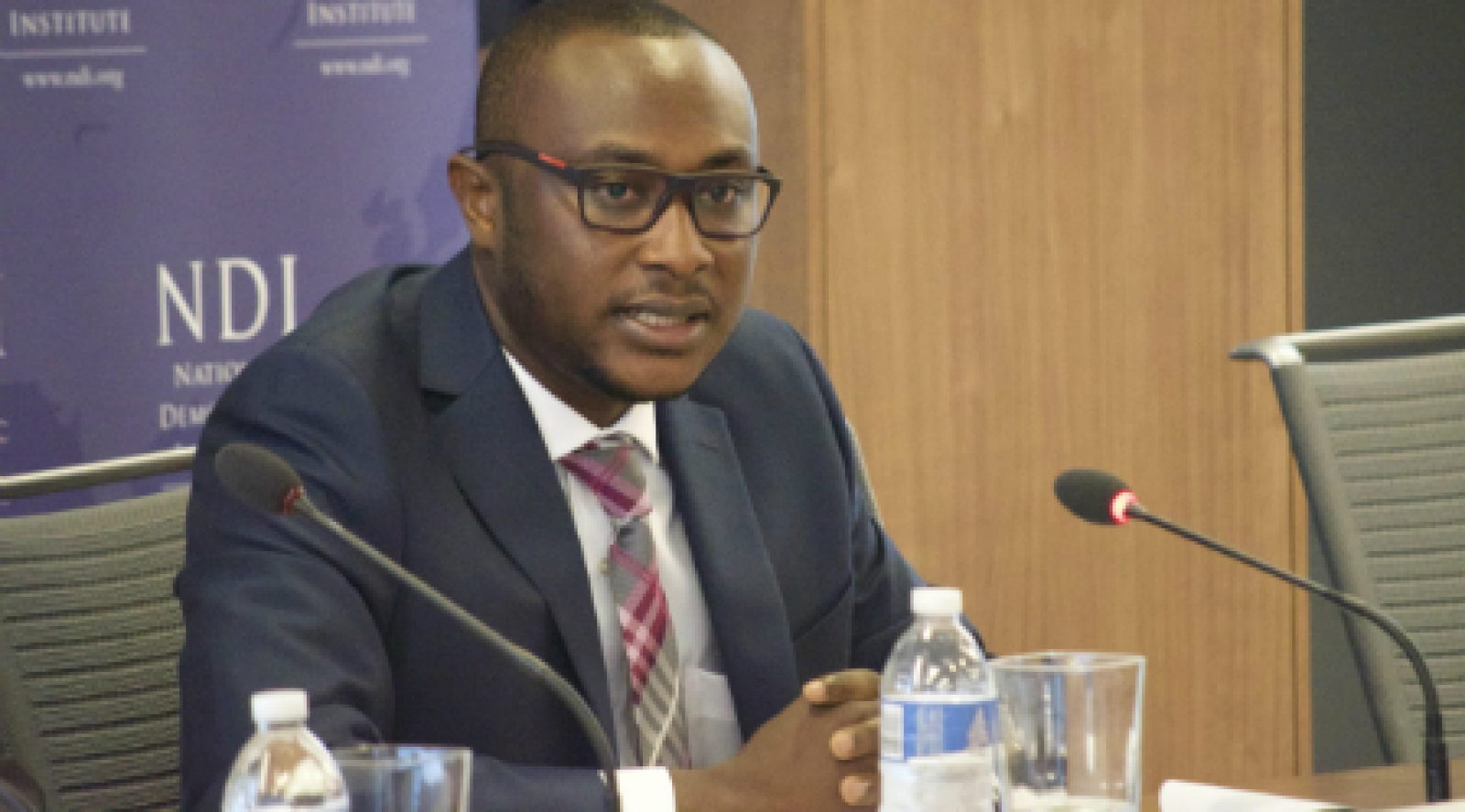
SHARE
ISSUES
While a rising number of African youth are getting involved in politics, their focus should shift from protests to the long-term work of building democratic institutions, according to Ibraheem ‘Bukunle Sanusi, deputy head of the African Union’s (AU) African Governance Architecture Secretariat.
“Young people are more engaged than they’ve been before due to the heightened penetration and access to information,” said Sanusi at a recent Washington event titled “Engaging Youth to Promote Democracy and Good Governance in Africa” hosted by NDI in late July. But as more youth are getting involved, Sanusi noted that it was important to look “beyond protests and civic disturbances” to other examples of more constructive ways to hold elected officials accountable and push for more government transparency in the long-term.
Examples of constructive youth involvement in politics can be found throughout Africa. Last year in Liberia, a student’s moving testimony about poor sanitary conditions in local schools during a government hearing prompted elected officials to develop a concrete plan of recommendations to the national legislature to improve facilities. In Kenya, young party activists from across the political spectrum came together to pledge a united commitment to upholding peace and tolerance in the 2013 national elections.
During the event, Sanusi highlighted other examples, “If you look at Uganda, there is a an organization called Parliament Watch that looks at the work parliaments and legislatures are doing and keeping them honest. In Nigeria there is a organization called BudgIT. They take the very technical budgets and turn them into graphics that demonstrate the ways in which money could be allocated differently.”
Since joining the AU, Sanusi has led the launch of DG Trends (Democratic Governance Trends), a campaign to broaden the AU’s youth engagement and mobilize young people behind a commitment to end conflicts in Africa by 2020. Since it’s launch, the campaign has recorded over 120 million impressions on social media.
During the event, Sanusi also shared why African youth participation matters and ways that the AU is helping more young people get involved: “If the demographic makeup of your country consists of 75 percent or 65 percent young people and women, you see clearly where the bulk of your work should focus, and for us [AU Commission] we think that is very important.”
Last month, the AU expanded on a partnership with NDI to identify ways for youth to get more involved in the political process, including helping young people run for office, pursue creative ways to hold elected officials accountable and meet their needs and participate more in political party decision-making. Building on this, the AU is planning a continental youth mentorship program for young people who want to get more involved in politics, organizing “Model AUs” hosted in higher education institutions across the continent to simulate how to run political structures and establishing “Youth Ambassador” positions to represent youth perspectives within the AU.
 From left to right: Aaron Azelton, NDI director for Citizen Participation; Sandra Pepera, NDI director for Gender,Women and Democracy; Ken Wollack, president of NDI; Ibraheem ‘Bukunle Sanusi, deputy head, African Governance Architecture Secretariat for the African Union’s Department of Political Affairs; Shari Bryan, vice president of NDI; Keith Jennings, NDI senior associate and regional director for Southern and East Africa programs; and Sophia Moestrup, NDI deputy regional director for Central and West Africa programs.
From left to right: Aaron Azelton, NDI director for Citizen Participation; Sandra Pepera, NDI director for Gender,Women and Democracy; Ken Wollack, president of NDI; Ibraheem ‘Bukunle Sanusi, deputy head, African Governance Architecture Secretariat for the African Union’s Department of Political Affairs; Shari Bryan, vice president of NDI; Keith Jennings, NDI senior associate and regional director for Southern and East Africa programs; and Sophia Moestrup, NDI deputy regional director for Central and West Africa programs. Sanusi further emphasized that youth involvement is not limited to a generic set of “youth issues,” but instead is about promoting youth voices in all of the policy challenges facing the continent. “It is a fact, it is known, that when young people are involved, there is a vigor, an energy, a burst of inspiration that you are able to tap into when you engage young people in any process,” said Sanusi.
Sanusi met with NDI President Ken Wollack, Vice President Shari Bryan, as well as several senior level NDI staff, to discuss the recently signed Memorandum of Understanding (MOU) between NDI and the AU Commission. The two organizations are currently collaborating on several initiatives, including a leadership workshop in Kigali, Rwanda, this upcoming November where young political activists from across the continent will meet to talk about ways to get youth more involved in political parties and run for office.
Read more:
● NDI Partners with African Union to Increase Youth Political Involvement
● African Youth Steer AU Agenda for “Silencing the Guns”
● Regional Consultations Focus on Youth Building a Culture of Democracy and Peace in Africa
Published on August 20, 2015


